‘Our Students Are More Than Ready for Any Top-rated PhD Programme’
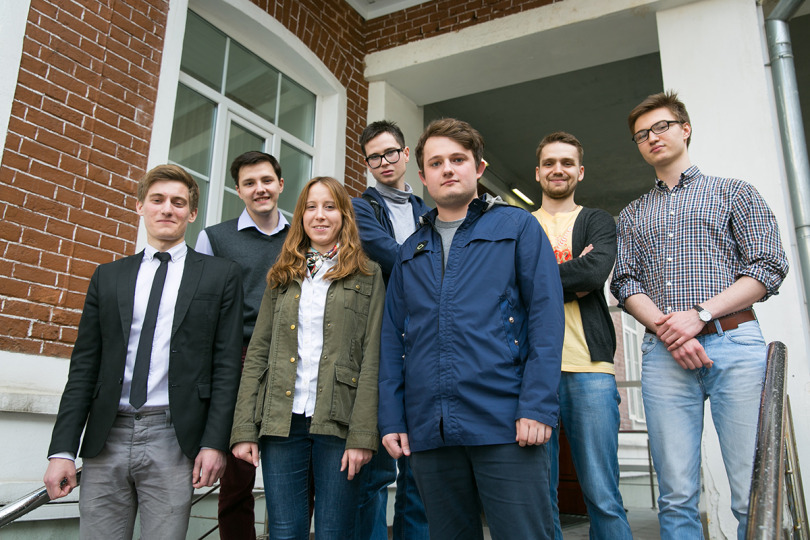
This year, 14 students and graduates of HSE's Faculty of Economics were admitted to PhD programmes at leading universities in the U.S. This is particularly noteworthy because nine of these students are seniors and graduates of HSE’s joint undergraduate programme with the New Economic School (NES) and of HSE’s undergraduate economics programme.
‘In the U.S., you can enter into a PhD programme right out of your undergrad, while in Europe, you typically start your PhD after you get your master’s, which is what our graduates generally do. Graduates of the Economics Faculty had never entered into a post-graduate programme right out of their bachelor’s [before this, there were only such cases at the International College of Economics and Finance (ICEF)]. That’s why this is truly a breakthrough for us, particularly considering the tendency of American universities to give preference to undergraduate students from other American universities, while admitting European students only after their master’s,’ the Dean of the Faculty of Economics, Oleg Zamulin, explains.
He adds that graduates of the Faculty of Economics’ undergraduate programme are fully ready to study at the PhD level.
‘I was part of the post-graduate admissions committee at the University of Michigan, and we had fairly clear guidelines that all applicants entering the PhD programme in economics have to have had at least one course in microeconomics, one course in macroeconomics, and basic math – analysis, linear algebra, probability theory, and statistics. Of course, we’d like for there to be more economics courses, but the amount we offer at HSE is not mandatory at all, so our students are more than ready for any top-rated PhD programme,’ Zamulin adds.
It is also important to explain to students what opportunities they have after getting their PhD, since they can go into more than just academics. They can work in consulting, investment banking, etc. since the competencies that this research programme offers is applicable to any field. ‘We invite all of our own graduates that are in PhD programmes to tell students about their experience, and the faculty’s international division offers support in technical and organisational issues since the post-graduate admissions process for an American universities differs from the process in Russia. At Western universities, things like recommendations are extremely important. And writing recommendations is an entire art for instructors, while for students, the art is in choosing whom to ask. Another important part is the student’s statement of intent. Many see this as a pure formality, but if the student has a poorly written statement of intent, he or she will completely destroy any chance of getting in. This must all be explained – both the fact that this is important, as well as how to do everything correctly,’ Zamulin notes.
The students admitted to American PhD programmes this year largely include undergraduate students in the joint bachelor’s programme between HSE and the New Economic School, which is currently releasing its first graduating class into the world. According to the programme’s Academic Supervisor, Ksenia Panidi, this was partly because the programme is comprised of very strong students; over half have won or placed at the All-Russian Economics Olympiad. In addition, students hear a lot about various PhD programmes, and they know what academic research really is. ‘We try to make is so that students study various sciences and understand that a person’s behaviour can be looked at from more than just an economic point of view. I believe this stimulates students’ interest in understanding the world and studying how the world works. And this is partly why they want to continue their education,’ Panidi comments.

Maria Voronina, a senior in the HSE-NES Undergraduate Programme, is off to Harvard University
I had already been to Harvard two years ago for an internship, and I wanted to return. Now I really like political economics. I’m writing my thesis on this and studying how political activity impacts the redistribution of income in society and how it affects taxation. The U.S. data that I work with show that politicians focus on the median voter and try to match this voter’s preferences.
I think my admissions journey began not in September of this year, but much earlier – reputation is key here. Also important was the fact that I did well academically, devoted a lot of time and attention to my thesis, and communicated a lot with my academic supervisor, NES Professor Maria Petrova.
I wouldn't recommend focusing on a PhD as a way to gain status, like many here in Russia do. Really, a PhD is a lot of work, and if it doesn't provide personal satisfaction, then it will turn into a completely unpleasant endeavour.
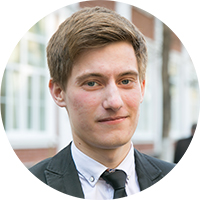
Alexander Belyakov, a senior in the HSE-NES Undergraduate Programme, was admitted to the Wharton School of the University of Pennsylvania
I got into the finance programme, not the economics programme. This is a more interesting topic for me, as I think finance is closer to real problems, and I get more satisfaction from this field. In a certain sense, it’s harder to get into a PhD programme in finance. There are simply fewer finance programmes than there are economics one, and six or seven is the standard number of people in a class in business school.
As concerns how to get in, I think recommendations are most important; everything else is less critical. My Academic Supervisor Sergei Stepanov wrote me a recommendation. He helped me a lot not only with the recommendation, but with writing my cover letter as well. In the letter, I wrote about what I’m doing in my undergraduate thesis – I research how corporate governance changed during the 2008 crisis. This is currently a rather lively topic, and I think this is one of the reasons why I was admitted into the programme.
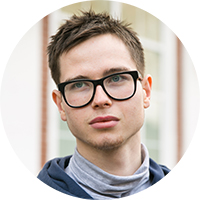
Arseny Samsonov, a senior in the HSE-NES Undergraduate Programme, is going to the University of California, Los Angeles (UCLA)
I applied and got into the political science programme since I'm more interested in politics than economics; I see more problems there. The University of California has an excellent reputation, but I also really wanted to study where there’s a lot of sunshine. My mood is really affected by this. California also has several professors I’d like to work with, such as Professor Michael Chwe. He researches cooperative games, another interest of mine. I try to use cooperative games in my undergraduate work to describe the behaviour of politicians, voters, rebellion leaders, and opposition leaders. Using formal models, I want to try to understand why in society, amid relatively identical preferences among voters, minority rights are violated in a dictatorship, but not in a democratic society.

Andrei Zubanov, a senior in HSE’s Undergraduate Programme in Economics, is headed to the University of Wisconsin–Madison
I had offers from several universities, but I was drawn to Wisconsin in particular because, first, is it a top-20 school in the U.S. Second, it is also strong in several areas, including economic theory, econometrics, and macroeconomics, so students get a balanced education. In the future, I’d like to have the opportunity to study microeconomic theory, but I understand that this might change since I might find something else I like once I’m in the programme. And third, I ‘bargained’ successfully with Wisconsin. I asked them to increase the size of the stipend, and they met me halfway, which is normal.
For now, I'm focused on an academic career, but anything can happen. This career gives you a lot of freedom though – you can find work in any country around the world and make good money doing what you love. Plus, you can help make the world a better place.
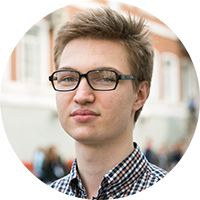
Dmitry Sedov, a senior in the HSE-NES Undergraduate Programme, was admitted to Northwestern University
I'm currently interested in information economics. More specifically, I’m writing my thesis on communication among competitors. I am interested in how economics can be used to analyse simple everyday processes like a conversation between two individuals who compete against one another, and how such simple tasks can be formulated and resolved. Northwestern has specialists who I can talk to about these areas.
As for the admissions process, I just want to warn people applying for next year that it will be a pretty intense process, as documents have to be submitted in the fall and a lot has to be done as concerns boring, bureaucratic work. You have to verify every sentence in your documents and communicate a lot with the people writing your recommendations. Face-to-face communication helps immensely. My Academic Supervisor Sergei Izmalkov, for example, helped me a lot, as did Professor David Parks, who wrote me a recommendation. I met him during an internship at Harvard. He conducts research at the interface of computer science and economics.
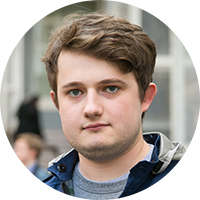
Egor Kozlov, a 2013 graduate of HSE’s Undergraduate Programme in Economics, is headed to Northwestern University
I currently study macroeconomics, mostly computational macroeconomics. I decided to apply for the PhD programme at Northwestern because it has a number of scholars in this field that I respect personally. This is also one of the strongest American universities. Plus, there's a large community of Russian students there, and Northwestern isn't far from Wisconsin and Minnesota, so I'll have a lot of good friends nearby, though I don't have any really close friends there yet.
What really helped me was the fact that I had a lot of people around me last year that were doing things to get into PhD programmes. I wanted to at least keep up with them. And yes, you should begin preparing long before I did. It seems like the process is fairly simple, but a lot of energy and time has to go into it.
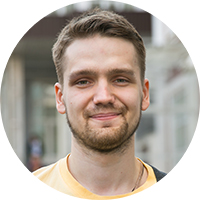
Egor Malkov, a 2014 graduate of HSE’s Master’s Programme in Economics, was admitted to the University of Minnesota
I got both my bachelor's and my master's at HSE. I've spent the last year teaching right here in the Economics Faculty, I conducted research, and I am now certain that it’s an academic career in particular that I want.
I'm going to the University of Minnesota firstly because it is one of the world’s top five universities for macroeconomics, which is my concentration. Secondly, my best friend studies there. We did our undergrad together at HSE, then he went to NES for his master’s. We parted ways, but now our paths are coming back together. We also have a good example to follow. About 10-12 years ago, two friends, Aleh Tsyvinski and Mikhail Golosov, graduated from the University of Minnesota. Both graduated from Belarusian State University, but Tsyvinski started in the PhD programme at the University of Minnesota a year before Golosov did. We are inspired by their example to a certain degree. I even wrote about this in my statement of purpose.
Also, I somewhat envy the people who got in as seniors this year. Three years ago, I didn’t even know this was possible. Students are much better informed now, and they see from their peers’ example that any university is a possibility. Sophomores, juniors, and seniors already understand what opportunities exist. I think being informed is already a step towards success.
Oleg A. Zamulin
See also:
ICEF HSE Takes Part in Study Abroad Fair in China among World's Leading Universities
On March 18, 2025, the Southwestern University of Finance and Economics (SWUFE), Chengdu, China welcomed its counterparts to the SWUFE Study Abroad Fair. Russia was represented for the first time at the fair by a delegation from HSE University, including members of ICEF.
'Studying at LUISS Is a Good Test to See How Committed You Are'
Andrei Lukyanov enrolled in ICEF Master of Financial Economics programme in 2019. In his second year, Andrei went to LUISS University in Rome as a double degree student. Currently a financial analyst at TAU Group, the Italian-Russian engineering startup, Andrei speaks on how to prepare for the career as a quant, the opportunities that come with studying abroad, and what duties the financial experts have in e-mobility.
'ICEF’s Best-performing Students Show Top Level of Skills'
Is it difficult to enroll in a university abroad? Where do Russian students go wrong when they start an overseas training programme? Will artificial intelligence eventually replace humans in the domain of Finance? We talked to Dr. Georgy Chabakauri of The London School of Economics and ICEF International Academic Committee to get answers to these and many other questions.
‘The Americans Were Incredibly Welcoming’
How do you film a standup routine at a farmers’ market? Are Vermonters friendly? How many methods of manipulation are there in photojournalism? This summer students of the HSE School of Media learned the answers to these questions and more when they completed media internships in the United States.
‘Don’t Be Afraid to Dream and Set New Goals for Yourself’
Every year HSE graduates get accepted to postgraduate schools at the world’s leading universities. Vladislav Semerikov is just now completing his fourth year in the Bachelor’s Programme ‘Economics’, and he has already been accepted to a PhD programme at Pennsylvania State University.
From Skete to Detinets. Exchange Students from UCL Explore the Birthplace of Russia
Under the ‘Study Abroad Programme in Russian Language and Culture’ students improve their language proficiency and explore the Russian cultural heritage. Recently, they have been to Veliky Novgorod.
From Istanbul Bilgi University to HSE, Students Share Their Experiences
For Yiğit Tahmisoğlu, Süleyman Saltoğlu and Ekimhan Can – students from Istanbul Bilgi University – the opportunity to study in the HSE and University of London Double Degree Bachelor’s Programme in Economics has meant facing a number of challenges while simultaneously benefiting greatly from what the programme has to offer.
From Contest to Internship at Holocaust Memorial Museum
Yanina Karpenkina won the 2016 annual contest for HSE students, which is organized by the International Centre for the History and Sociology of World War II and Its Consequences. Thanks to the contest, she went on a six-week internship as a research assistant with the Jack, Joseph and Morton Mandel Center for Advanced Holocaust Studies at the United States Holocaust Memorial Museum.
Holland, a Country of Contrasts and Professionals
Simulation games involve the recreation of various situations within the framework of a specially designed environment. There are many different types of games, but most come in the form of computer simulations used in the fields of medicine, flight training, business, and politics. Simulation games are unique in that they are used mostly in practice; that is, they are constructed and only then is one able to see whether these constructions work or not. To learn how to take a scientific approach towards this topic, Natalia Isaeva, Junior Research Fellow and Doctoral student at the Institute of Education went to the Netherlands to study at Maastricht University.
‘ICEF Helped Me Realize Two of My Dreams’
Every year, the best achieving ICEF students are given the opportunity to go to the LSE Summer School in London. ICEF sponsored three students in 2015, and two students received a grant from LSE and ICEF. We asked LSE Summer School 2015 participants to tell us what helped them become best academic achievers and to share their impressions of the summer school and the city. It turned out that they have different life strategies, but they share a love of LSE library and the desire to learn and work hard.


